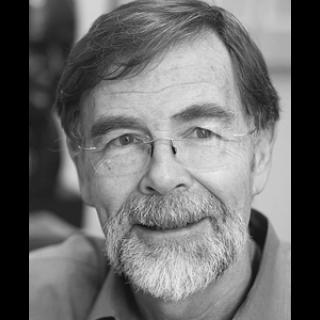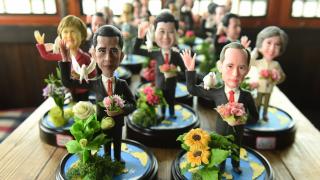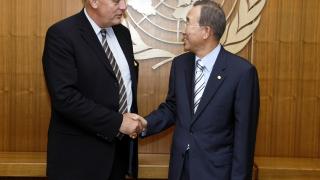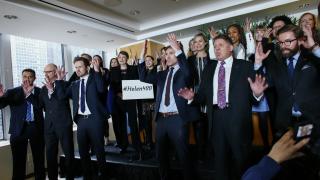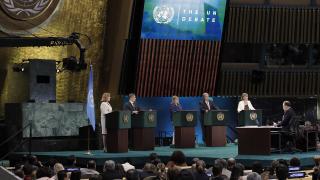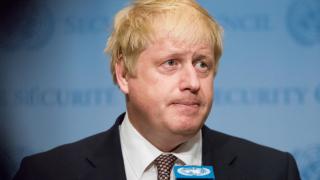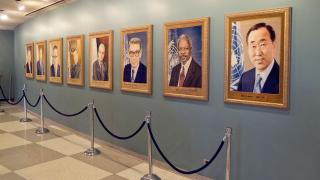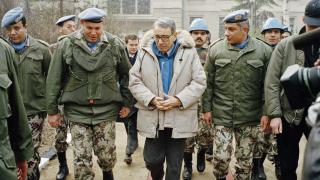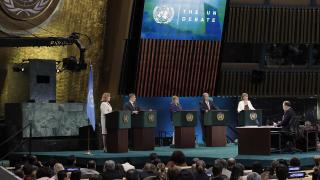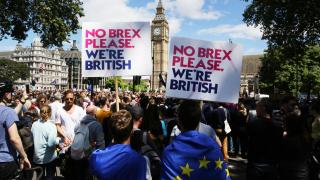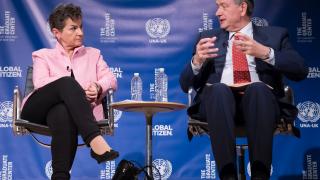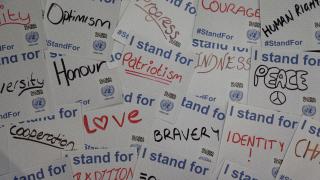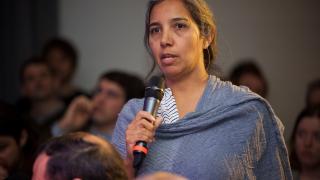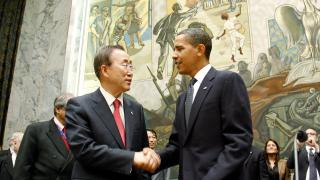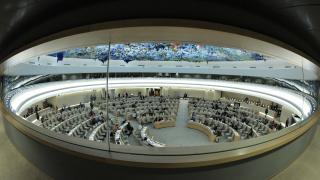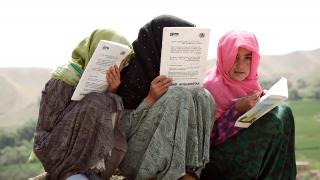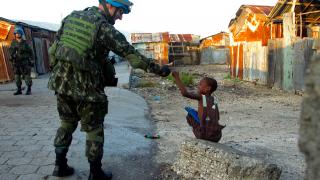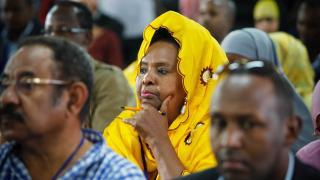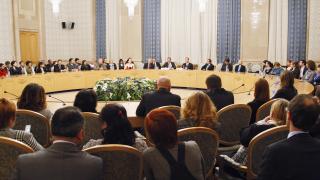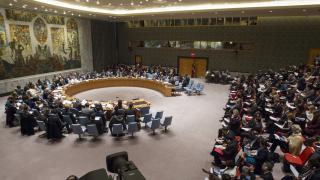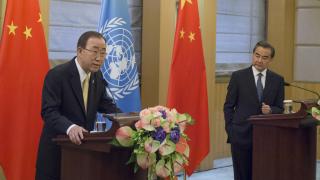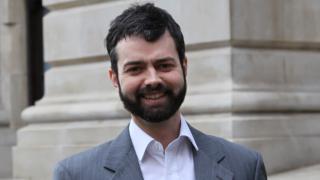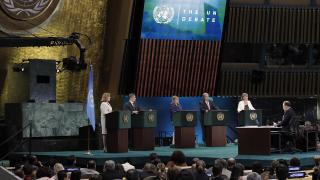
Sometime later this year, a new UN Secretary‑General will be selected to take over from Ban Ki‑moon in January 2017. Why is the choice of the ninth head of the world organisation so important? And how has the election slog been going?
For only the second time – the first was in 1996 – the campaigns for the US president and the UN’s top job are running in parallel. Both have been long and protracted. While the US result has produced one Republican and one Democratic candidate, the UN version still has a large slate of nominees pressing the flesh and employing lobbyists, although not yet kissing babies.
In the past, the two processes have been very different. The US presidential aspirants have been watched, tested, and paraded in front of respectful and hostile audiences in a primary process that is arguably far more prolonged and thorough than that for any other prospective head of state. The selection of the UN Secretary‑General, in contrast, has more closely approximated a papal conclave composed of the five veto‑wielding members of the Security Council – the P5: China, France, Russia, the UK and the US. The P5’s recommendation was then rubber‑stamped by the General Assembly after the white smoke emerged from the Security Council chamber.
The electoral campaign for the ninth Secretary‑General – a position which the first incumbent, Trygve Lie, described as “the most impossible job in the world” – thus far has been different. While the end result is still unclear, the Danish president of the 2015–16 General Assembly session, Mogens Lykketoft, has described the civil society advocacy effort by the 1 for 7 Billion campaign as a “potential game changer”. We note the adjective “potential”.
If seven billion constituents, along with 188 other member states, cannot have a real say, could their views at least be better represented? Could some modest accountability not be introduced into the usual great power manipulation? How about a job description?
The campaign has called for geography to take a back seat to integrity and for a transparent and inclusive process to identify a Secretary‑General who is “highly skilled, competent, persuasive and visionary”. For the first time, gender has become central, with the preference of many civil society groups and countries being specifically in favour of a woman. After eight males, female candidates have been actively solicited. Half of the 12 people nominated to date are women. At the time of writing, two (and one man) had withdrawn and another woman was expected to enter the race.
If seven billion constituents, along with 188 other member states, cannot have a real say, could their views at least be better represented? Could some modest accountability not be introduced into the usual great power manipulation? How about a job description?
The 1 for 7 Billion campaign has also recommended a single term of perhaps six or seven years for the next Secretary‑General, a proposal that has been raised repeatedly over the years but without success. Doing so would require overcoming tradition but not a revision of the Charter, and it could eliminate the caution that customarily goes with concerns for reappointment and jolt the incumbent with a greater sense of urgency to strengthen – actually transform – the organisation.
The eventual outcome remains far from certain, and only Pollyanna would hope for politics to be set aside in favour of qualifications. At a minimum, the process has raised the potential embarrassment to the P5 if they recommend a clunker.
However, some useful steps have been made. Nominations have come from countries in different regions, although still none from the two largest regions: Asia or Africa. There have been two‑hour hearings in the General Assembly with every candidate, split into batches in April, June and July, as well as three civil society debates (in New York and London) during those same weeks. The curricula vitae of candidates have been made available online for public scrutiny. Candidates have also published vision statements, some of which include thoughts for the shape of the UN system and how to make the most of its 80,000 international civil servants and 120,000 soldiers and civil ians in peace operations.
While eyes often glaze over at the mere thought of trying to alter the world organisation, there are three overwhelming reasons to reject such complacency. The first is the progressive marginalisation of the UN in many of its major functions, manifested by the creation of alternative organisations and sources of support designed specifically to circumvent the UN’s unwieldy bureaucracy. Actors from the G20 to the Gates Foundation are emerging as active competitors.
The second is that across a huge range of responsibilities, the challenges to the UN and the world are growing, but the UN is often unable or unsuited to act. Some of the world’s major conflagrations remain unresolved. Human rights and the status of women are still widely abused. The UN struggles to keep up with repeated humanitarian disasters. And its development activities across social, economic and environmental domains are marginalised, dispersed and duplicative. Global challenges demanding global responses – choose your favourites from pandemics like Ebola and terrorist attacks like those in Brussels and Paris, to climate change and the proliferation of weapons of mass destruction – are increasing in numbers and intensity.
The third reason is that evidence from past attempts at reform shows that a strong leader, committed to change, and with the communication skills to match, can actually make a difference. If the UN is not to become a relic, the question is not what and whether, but rather when and how substantial adaptation will take place. It is critical to identify and select a Secretary‑ General who understands the flaws in the structure and staffing of component parts of the UN family and has the knowledge, determination, and – dare we say – charisma to correct them because the possibilities for change are greater at the onset of a new Secretary‑General’s term, the ‘honeymoon’ of the first six to twelve months. Both Boutros Boutros‑Ghali of Egypt and Kofi Annan of Ghana instituted their most sweeping staffing and management changes in 1992, 1997 and 2002 – shortly after their appointment or reappointment. Let’s hope for similar initiatives from the successful candidate in 2017.
The process to date has witnessed welcome changes, but will they be sufficient to guarantee a strictly meritocratic process leading to the selection of a high‑ calibre Secretary‑General? That requires a new spirit of boldness and originality among all governments, and especially among the P5, in influencing the selection. In a recent FUNDS survey of experts and UN‑ watchers, respondents were asked to name their preferred candidate. The name most frequently mentioned was Angela Merkel. She is not (yet) looking for the job, but she is the kind of person who should occupy the office on the 38th floor of UN headquarters on 1 January 2017.
Photo: Mogens Lykketoft organised the first-ever televised debate with Secretary-General candidates, in partnership with Al Jazeera. Candidates participating in the first round (from left to right): Natalia Gherman (Moldova), Vuk Jeremic (Serbia), Susana Malcorra (Argentina), António Guterres (Portugal) and Vesna Pusic (Croatia).

